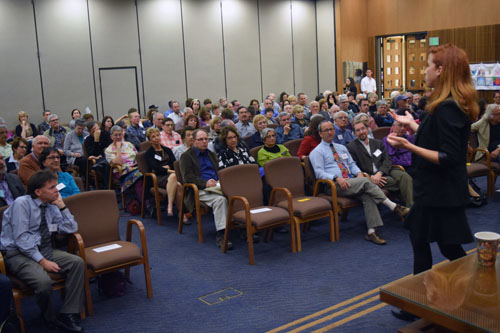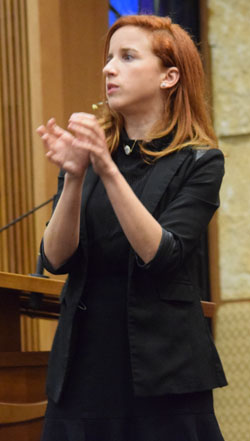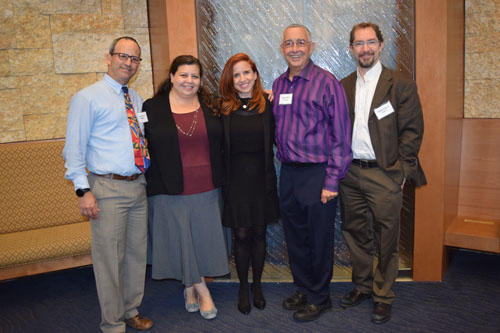
Story by Donald H. Harrison; photos by Shor Masori


SAN DIEGO — Stav Shaffir, a member of the Zionist Union party, said Tuesday evening that too many financial transactions authorized by Israel’s ruling government coalition are hidden from the public, and would not withstand scrutiny if light were shined upon them. Among the most notable examples, she said, are diversion of funds intended for development communities in the Negev and the Galilee to communities in the disputed areas of the West Bank, also known as Judea and Samaria. She said that investigators found that 75 percent of one appropriation involving millions of shekels had been secretly diverted to the West Bank.
Shaffir, an opposition member of Israel’s Knesset whose demands for government transparency and accountability are her trademark, told a J Street audience of 200 at Temple Emanu-El that such abuses could be curbed if Israel’s government had committee hearings similar to those of Congress or Parliamentary question periods such as the Prime Minister of the United Kingdom submits to regularly. Currently it has neither process.
Another abuse of Israel’s budgeting process, she said, is money that is secretly siphoned off by politicians to pay their movement’s supporters.
Having become a popular figure as a result of housing and economic street protests that she had led in Israel, Shaffir three years ago at the age of 27 became the youngest woman to ever be elected to the Knesset. Assigned to the Knesset’s budget committee, she said she soon learned that many MKs (Members of the Knesset) voted for the budget without ever reading or discussing the legislation before them. Sometimes details of the budget weren’t even available.
She said she wanted the public to know about how the Knesset budgetary process worked, so — like other members of her generation — put the available material on Facebook. In her postings, she asked the public for help in analyzing the budget. She described a popular reaction that led to numerous volunteers devoting their time to pinpointing and defining just where the people’s money was going.
Like other members of the Zionist Union–currently led by Isaac Herzog–Shaffir says that she favors a two-state solution to preserve Israel as both a Jewish state and a democracy. She said that most Israelis–at least 60 percent– agree with that position, but they are fearful that under a Palestinian government the West Bank would become another Gaza, constantly launching rockets against Israel and otherwise threatening its security.
She said Zionism was built on hope, not on fear, but that the current government under Prime Minister Benjamin Netanyahu cynically plays on the people’s fear about the country’s security. She said a coalition of hope should develop a popular campaign to persuade Mahmoud Abbas, the president of the Palestinian Authority, to commit to real negotiations based on the armistice lines that were in force prior to the 1967 Six Day War, with a mutually agreed exchange of territories. She said Israel should remove settlements from the West Bank that lie outside the major settlement blocs, most of which lie close to Jerusalem. Removing settlements from the interior of the Palestine Authority’s proposed territory would show the world that Israel really wants peace. At the same time, she said, the Israel Defense Forces should remain in the disputed areas to ensure Israel’s security at least until such time as a treaty is signed.

Like most Israelis, Shaffir served in the Israel Defense Forces. She wanted to be a pilot but didn’t make the cut, so became a military journalist, covering the evacuation of Jewish setttlers from Gush Katif in the Gaza Strip. While that evacuation was traumatic, and some 400 families more than a decade after the evacuation unjustly remain without promised homes, the overall impact of the Gaza withdrawal was healthy for Israel because it made the heartland more defensible, Shaffir said. Similarly, she said, withdrawal to an agreed border between Israel and the West Bank would also make Israel more defensible, while preserving the democratic character of Israel intended by its Zionist founders.
Shaffir said she favors neither the Netanyahu government’s lack of action toward the two-state solution, nor forcing action by such anti-Israel campaigns as the BDS (Boycott, Divestment and Sanctions) movement, which she said has been tinged with anti- Semitism. Progressives, she said, must find a third way, one that galvanizes not only the Israeli public’s desire for peace built upon the concepts of two states living side by side, but also the Palestinian public’s as well.
The Knesset member said Arabic and Hebrew should be taught to both communities from kindergarten on, and that more and more Israeli schools should be integrated so that students from both communities learn together from an early age. This concept should apply not only to Jews and Arabs, but also to children from secular and religious families, she said.
Asked in a written question if she thought Zionist Union leader Isaac Herzog should resign if corruption charges are brought against him, she said he should if the charges were proven serious.
Ken Stone, a reporter/editor for The Times of San Diego who the evening before had covered a rally at the Town & Country Hotel for Republican presidential candidate Ted Cruz, said the security for Shaffir’s talk was tighter than it was for Cruz’s rally. At the temple, a few members of a local private security firm had been hired locally to check people’s bags, and to ask men to open their coats.
*
Harrison is editor of San Diego Jewish World. He may be contacted via donald.harrison@sdjewishworld.com. Comments intended for publication in the space below must be accompanied by the letter writer’s first and last name and by his/ her city and state of residence (city and country for those outside the U.S.)